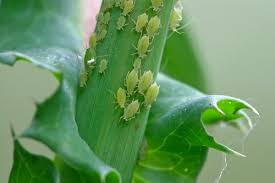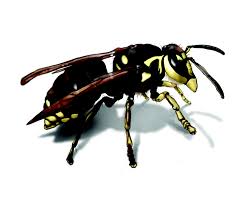If we study about any bug or insect we should know the term
“symbiosis”. If you ever had lice or your cat or dog ever had fleas, you've witnessed symbiosis in action. Similarly most of the insects or bugs posses symbiosis. A symbiotic relationship can have a positive, negative, or neutral effect on the individual species. A symbiotic relationship possessed by any insect or bug may be of following types -
- mutualism – When both species benefited from the interaction.
- Parasitism – When one species is benefited and other is harmed.
- Commensalism – When one is benefitted and other have neutral effect.

Among the bugs and insects which posses symbiosis, mostly are parasites.
Others, which don’t posses symbiosis may be eusocial,Coleoptera, Diptera, Hymenoptera or Lepidoptera.
Here is a list of more common bugs and insects which we encounter in daily life -
 | Ant
Ants are eusocial1 insects. It lives in nests and most varieties are harmless, although some can also bite |
 | Aphids
Aphids, also known as plant lice. A common pest on many plants, these sap-sucking insects are often noticed feeding in clusters on new plant growth. |
 | Bee
Bees are known for their role in pollination and for producing honey and beeswax. |
 | Beetle
Beetles eat grubs, caterpillars, fly maggots and pupae, aphids, weevils, earthworms, snails, slugs |
 | Butterfly
A butterfly is a mainly day-flying insect whose life cycle consists of four parts: egg, larva, pupa and adult. |
 | Cricket
Crickets are are insects somewhat related to grasshoppers. They tend to be nocturnal |
 | Caterpillar
Caterpillars have been called "eating machines", and eat leaves voraciously. |
 | Cockroach
Cockroaches are insects of the order Blattodea, which also includes termites. About 30 cockroach species out of 4,600 are associated with human habitats. About four species are well known as pests. |
 | Dragonfly
Dragonflies are valuable predators that eat mosquitoes, and other small insects like flies, bees, ants, and very rarely butterflies. They are usually found around lakes, ponds, streams and wetlands |
 | Flea
Fleas are small flightless insects that form the order Siphonaptera. They are external parasites of warm-blooded animals, living by hematophagy off the blood of mammals and birds. |
 | Fly
They are known for transmitting diseases. |
 | Grasshopper
Grasshopper are winged, but their wings are not fit for flight. |
 | Hornet
Hornets are the largest of the eusocial wasps, and are similar in appearance to their close relatives yellow jackets. Some species can reach up to 5.5 cm in length |
 | Ladybugs
Ladybugs, also called lady beetles or ladybird beetles, are a very beneficial group. They are natural enemies of many insects, especially aphids and other sap feeders. |
 | Louse
(plural lice) parasitic insects that live on the skin of mammals and birds. |
 | Mosquito
The females of many species of mosquitoes are capable of drinking blood from many mammals. They are vectors for a number of infectious diseases |
 | Moth
A moth is an insect closely related to the butterfly. Moths are nocturnal. |
 | Spider
Spiders are found worldwide on every continent except for Antarctica. a few species of spiders are venomous and are dangerous to humans |
| |
 | Termites
While termites can be helpful in breaking down rotting wood in the environment, these wood-destroying insects also can cause extensive damage to homes. Sometimes called “silent destroyers”. |
 | Wasp or Yellow-Jacket
A wasp is any insect of the order Hymenoptera and suborder Apocrita that is neither a bee nor an ant. They can be quite agressive. |
1.eusocial - denoting social organisms (e.g. the honeybee) in which a single female or caste produces the offspring and non-reproductive individuals cooperate in caring for the young.
Also read -






Comments
Post a Comment